
ATNi partnership with ShareAction
Access to Nutrition initiative (ATNi) develops and publishes private sector accountability tools for various countries, tailored to their specific context.
ATNi intends to play its part in tackling the UK’s diet-driven health challenges by rating and tracking over time the contribution major UK food companies make to addressing them.
In 2019, ATNi teamed up with ShareAction – a UK-based charity – to support its new Healthy Markets campaign.
Funded by Impact on Urban Health, part of Guy’s & St Thomas’ Foundation, Healthy Markets is designed to tackle rising childhood obesity levels in the U.K. As with other ShareAction initiatives, Healthy Markets works with institutional asset owners, pension schemes and individual savers concerned about the impacts their investments are having on society.
Healthy Markets is building to a coalition of investors – which includes some of ATNi’s Investor Signatories – to press UK food and drinks companies to do all they can to improve their consumers’ diets.
In September 2019, ATNi published the first UK Product Profile:
In March 2020, ATNi published the UK Supermarket Spotlight:
In September 2021, ATNi published the UK Product Profile 2021:
In May 2022, ATNi published the UK Retailer Index 2022:
In November 2022, ATNi published the Action Research report Eating out of home in the UK:
Research on UK Manufacturers
The Product Profile 2019 presents an analysis excerpted from research initially published within the Global Access to Nutrition Index 2018.
The U.K. Product Profile paints a picture of the overall nutritional quality of the products sold by 18 of the world’s largest food and beverage manufacturers in the UK market. The Product Profile found that only 937 of all products analysed across 18 product categories (31%) meet the Health Star Rating (HSR) healthy threshold of 3.5 stars out of 5. The other 2,132 products (69%) fell below that level.
Based on the findings of this analysis, ATNi recommended food and beverage manufacturers reformulate their products to improve their nutritional quality, adopt a stringent nutrient profiling system similar to the HSR system, stop marketing products that are not healthy to children, increase the proportion of marketing dedicated to healthier products, take a structured approach to addressing nutrition by adopting SMART targets for key nutrients, and improve their accountability through better annual reporting.
UK Product Profile Report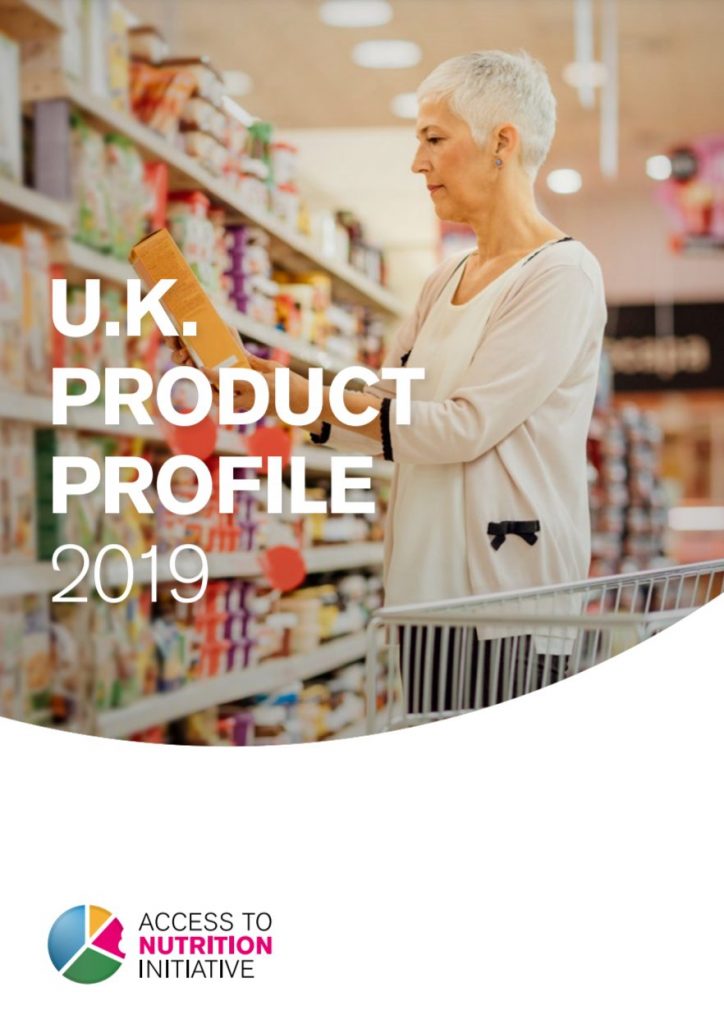
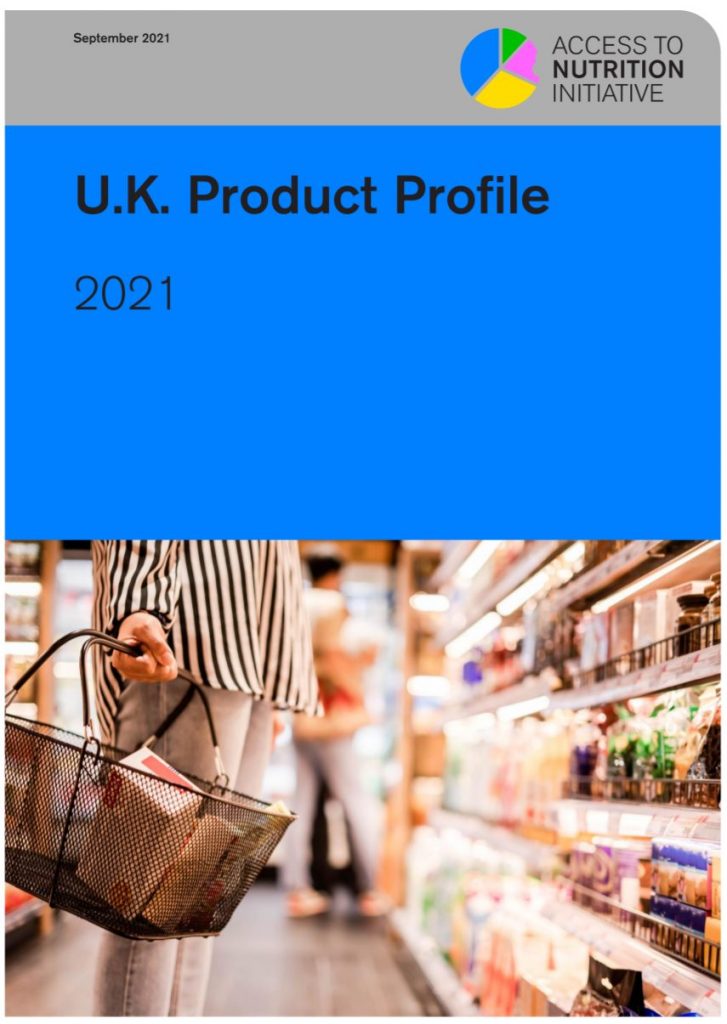
The UK Product Profile 2021 assesses the nutritional quality of 4,207 products from 16 of the world’s largest food and beverage manufacturers selling in the UK, using the data from the Global Index 2021. The products analysed accounted for approximately 50% of total UK retail sales of manufacturer brands’ packaged foods and beverages in 2019.
Findings from this report reveal that the average mean HSR for all products assessed is only 2.2 out of 5 stars and only 32% of the products assessed met the healthy threshold of 3.5 out of 5 stars. Results indicate that companies need to do more to improve the nutritional quality of their products in the UK. Yet, the report also revealed that manufacturers can make progress on nutrition. Sales from healthy products increased from 22% in 2019 to 29% in 2021, and the sales-weighted mean HSR for nine out of the 16 companies assessed also increased since the UK Product Profile 2019.
ATNi recommends that companies introduce healthier product varieties, adopt a robust nutrient profiling model, improve accountability through better reporting, including disclosing the proportion of sales derived from healthy foods, and re-direct investments towards marketing of healthier products.
Research on UK Retailers
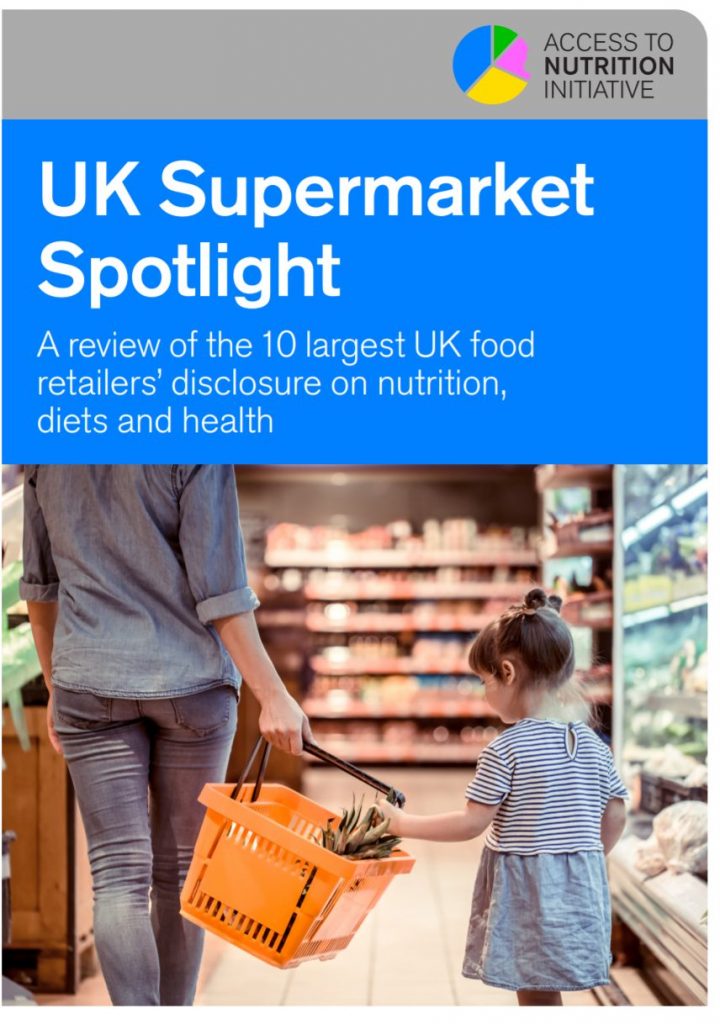
In March 2020, ATNi published the UK Supermarket Spotlight, which analysed the disclosure of the 10 largest supermarket chains on diet, nutrition and health, using a methodology developed in consultation with experts.
ATNi found that most of the 10 retailers appear to recognise that they have a role to play in addressing the UK’s diet and health-related challenges, but that their reporting is limited. Sainsbury’s reports most extensively, on 35% of the indicators used for this assessment, followed by Marks & Spencer at 33% – though these two companies, plus four others, only achieved a Grade D (reporting on between 20% and 39% of all indicators). The remaining four companies were rated Grade E as they reported on fewer than 20% of indicators. Asda and Iceland have the most to do to improve their disclosure, scoring 8% and 7% respectively. None of the retailers achieved a grade of A, B or C.
UK Supermarket Spotlight Factsheet
On May 11, 2022, ATNi published the UK Retailer Index 2022.
ATNi’s UK Retailer Index 2022 is the first full nutrition- and health-specific Index to assess the largest 11 grocery retailers in the United Kingdom: Aldi UK, Asda, Co-op, Iceland, Lidl GB, Marks & Spencer, Morrisons, Ocado, Sainsbury’s, Tesco and Waitrose. This report is the latest in a suite of materials produced by ATNi in its partnership with ShareAction, which has included the publication of the UK Supermarket Spotlight 2020 and two UK Product Profiles (2019 and 2021).
Findings from the report indicate that there is very considerable variation in the performance of the retailers, with no one company standing out as taking strong action across all 8 Topics assessed – see the Methodology for further details on the scope and depth of the assessment. The average across all retailers is 3.3 out of 10, illustrating that all companies need to enhance their efforts to encourage healthier diets in the UK. However, the fact that 9 of the 11 retailers submitted data during the research shows that nutrition and health are considered to be important issues for these UK supermarkets.
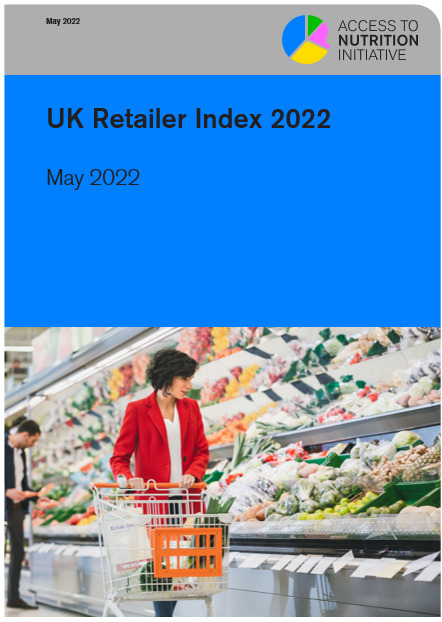
Research on the out of home (OOH) sector
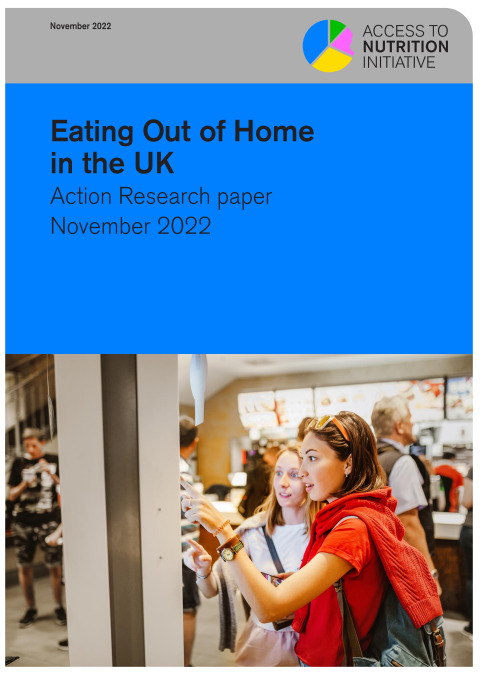
On November 10, 2022 ATNi published the Action Research paper Eating out of home in the UK, assessing 10 of the largest publicly listed players in the OOH food sector in the UK, including well-known brands (burgers, bakery, pizzas and coffee) and, where applicable, their parent companies.
It is the first time that ATNi has researched the OOH food sector in any country in the world. The research looked across six nutrition-related Topics, developed in consultation with UK experts and adapted from the Categories used in ATNi’s methodology.
Today, around a quarter of energy intake in the UK comes from food eaten out of the home, over half of which is purchased from the large chains. At the same time, about 30% of spend on food in 2019/20 was on food eaten out of the home. Findings indicate that current reporting gives the impression that nutrition and health are not at the centre of governance and action of the companies.
In this context more than ever, companies – and every actor in the UK food landscape – have a role to play to promote better nutrition for all.

